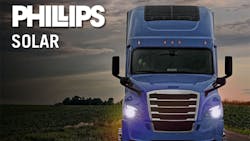Phillips launches durable solar panels for trucks and trailers
Phillips Industries now offers sturdy solar panels that can be equipped to the surface of tractors and trailers to absorb the sun’s rays and help power assets. The peel-and-stick panels can provide up to 34 hours of power for in-cab HVAC and auxiliary systems with the diesel engine off to eliminate the need for idling, while also improving battery life and reducing parasitic loads. Implementing the solar solution should enhance uptime and fuel efficiency while reducing maintenance costs and emissions output, the company said.
According to a Phillips study, fleets that equip the solar panels found a 0.23 mpg improvement versus similar models, resulting in a decrease of 400 gallons of diesel per year, as well as a 9.3-ton reduction in CO2 emissions.
Read more: Phillips Industries debuts T/T Pair for tractor/trailer connectivity
These panels may be a major step-change in efficiency for the industry, as Phillips said the monocrystalline silicon (mono-cSI) solar panels are 80% lighter than traditional glass systems. The thin film technology also produces 20% more energy with a 50% higher power density. The seven different configurations—for Class 8 tractors, reefer units, and liftgates—all contain peel-and-stick panels, heavy-duty solar chargers, and advanced jump-start avoidance technology.
The company said they are “ultra-durable, as well,” withstanding rock and tree impact, extreme vibration, and hurricane-level winds. And because the cells use a grid system, they work independently from each other and have optimized performance in non-optimal light conditions—even when damaged.
"By integrating our solar technology, fleets can expect not only significant improvements in fuel efficiency and battery life but also enhanced compliance with evolving environmental regulations,” Phillips CEO Rob Phillips noted. “This shift towards solar energy is more than an operational upgrade; it's a strategic move towards sustainability that will redefine the economic and environmental landscape of commercial trucking."
The kits are also eligible for the federal solar tax credit (Investment Tax Credit), so fleets can realize a faster ROI by deducting a large portion of the cost from their federal taxes.
